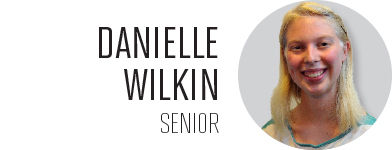
Senior biology and science education major
Imagine your English professor gave you a prompt that read: “What do you believe?” A million thoughts and ideas probably come flooding into your mind, and your only limit is how fast you can type them all out. Before you know it, you will have a mile-long list ranging in topics from morality to religion to politics. Unfortunately, the majority of the opportunities we are given to define our own belief systems, both personally and in academia, do not allow for this kind of expansive and unrestrained thinking.
Instead of your professor giving you the prompt on a blank page and telling you to write freely, he hands out a checklist of specific criteria to agree or disagree with, and once your data is compiled, you are told your affiliations. Without the chance to discover our beliefs outside of predefined conventions, we are automatically assigned a label that reflects only a majority of our opinions and ignores “outliers” that do not fit comfortably into the existing schema.
Attempts to diverge from the principles of established groups, parties or factions are met with resistance. In turn, we comprise our ideals or prematurely end our philosophical investigation so as not to create conflict.
Without being able to question and ponder uninhibitedly, all ability for personal growth is lost. Our opinions are far more varied than the “isms” we allow ourselves to be defined by. Ferris Bueller explained it best: “A person should not believe in an ‘ism,’ he should believe in himself.”
Operating under the faulty assumption that a group of individuals can have identical opinions, we end up defining our beliefs in the terms used by those before us. In effect, the individuality we are trying to explore is curtailed by an adherence to the preset definitions of the groups we are forced to ascribe ourselves to. In this environment, it becomes safer to limit the scope of our beliefs than risk the isolation and voicelessness that often accompany independent thought.
Schools and businesses pride themselves on diversity, thinking of it only in terms of finite categories like race, political affiliation and religion. Doing so ignores the individual differences among the members of a given group. That would be like saying the rainbow only consists of the colors in ROYGBIV, effectively dismissing the teals, chartreuses and magentas that not only make a rainbow more beautiful, but help connect and unify all the other hues.
Corny analogy aside, the compulsion to organize our diverse beliefs into discrete, labeled categories fails to recognize the small differences that add up to a person’s unique ideology. That is not to say that unifying under a single label is inherently destructive.
History was written by those who rallied behind a shared idea and inspired great change. But this cannot be done without acknowledging and respecting the distinct experiences and opinions held by each person, and in doing so, reflecting a deeper and truer diversity than that which we are forced to mark on an application.
Danielle Wilkin is a senior biology and science education major. She can be reached at dwilkindbk@gmail.com.



